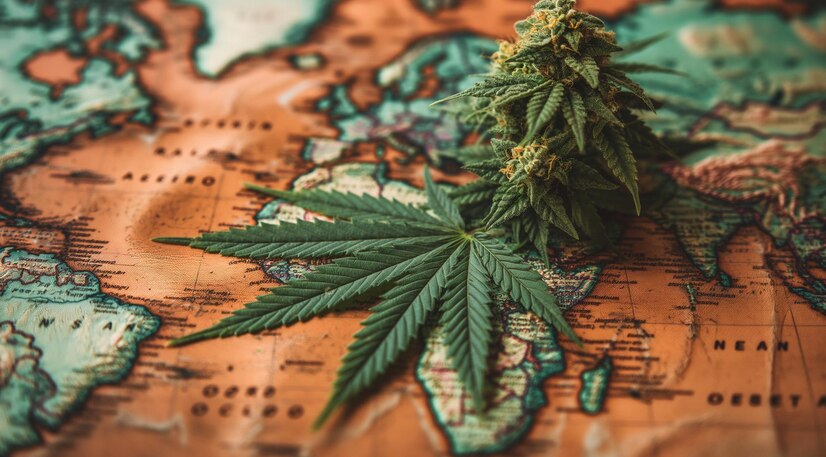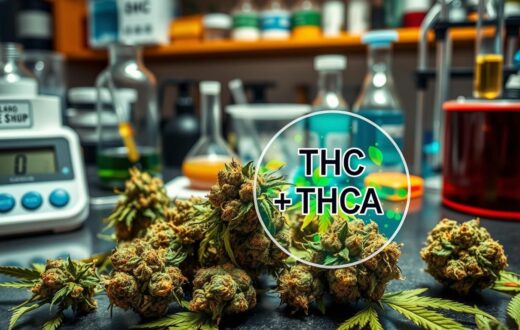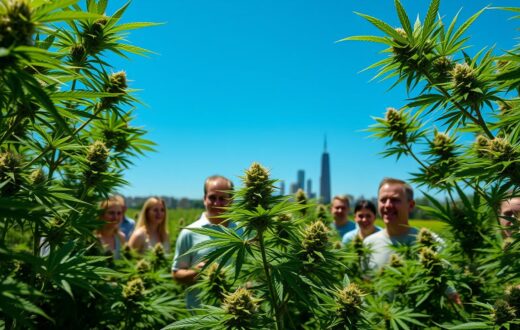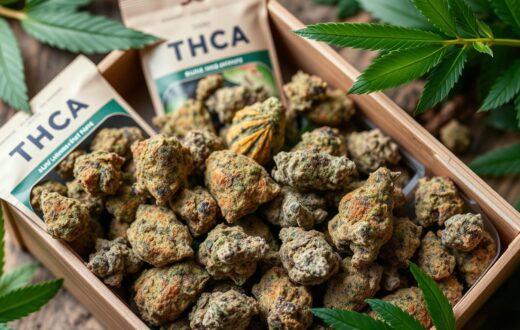Ever wondered why THCA is legal in some states but not others? This compound, found in raw cannabis, has sparked a complex legal debate across the United States. With the landscape of cannabis laws constantly shifting, understanding the legal status of THCA can feel like solving a puzzle.
THCA legality by state varies widely, reflecting the diverse approaches to cannabis regulation across the country. While the 2018 Farm Bill set the stage for THCA’s federal legality, individual state cannabis laws have created a patchwork of regulations.
Surprisingly, THCA is legal in 45 U.S. states, including Texas, Florida, and Georgia. This means 100% of states with legalized recreational cannabis allow THCA. However, only 25% of states with both medical and recreational cannabis programs have no restrictions on THCA.
The legal status of THCA often hinges on its source and THC content. In 75% of states, THCA is legal if it complies with Farm Bill regulations, which set a 0.3% THC limit for hemp products. This threshold has become a key factor in determining the legal status of THCA across the nation.
As we dive deeper into this guide, we’ll explore the nuances of THCA legality, helping you navigate the complex world of cannabis laws. Whether you’re a curious consumer or a cannabis enthusiast, understanding these regulations is crucial in today’s evolving legal landscape.
Understanding THCA: What You Need to Know
THCA, or tetrahydrocannabinolic acid, is a key compound in cannabis. It’s the precursor to THC, the well-known psychoactive component. Let’s dive into the world of THCA and explore its properties, legal status, and potential benefits.
Definition of THCA and Its Properties
THCA is abundant in raw cannabis plants. It’s non-psychoactive, meaning it won’t get you high. The 2018 Farm Bill legalized hemp-derived THCA products with less than 0.3% delta-9 THC. This opened doors for various THCA products in the market.
Differences Between THCA and THC
The main difference lies in their effects. THCA doesn’t cause intoxication, while THC does. When heated, THCA converts to THC. This process, called decarboxylation, happens when smoking or cooking cannabis. Delta-9 tetrahydrocannabinolic acid regulations focus on this conversion.
Potential Health Benefits of THCA
Research suggests THCA may have health benefits. Animal studies show anti-inflammatory, anti-nausea, and neuroprotective effects. Some people use hemp-derived THCA for pain relief and appetite stimulation. However, more research is needed to confirm these potential benefits in humans.
It’s crucial to note that THCA’s legal status varies by state. While federal law allows hemp-derived THCA products, state regulations differ. Always check local laws before purchasing or using THCA products.
Federal Legality of THCA
The 2018 Farm Bill changed the rules for THCA and other hemp products. It made hemp and its derivatives legal, setting up guidelines for each state. The bill says legal hemp products can have no more than 0.3% delta-9 THC by dry weight.
Farm Bill Overview
Under federal law, THCA is legal if it comes from hemp with less than 0.3% THC. This rule has led to different views on THCA in each state. Some states follow this rule, while others have stricter rules.
THC and Cannabinoid Regulations
The DEA’s 2020 Hemp Rule says hemp products can’t have more than 0.3% delta-9 THC. This rule affects how states handle THCA products. For example, California allows THCA products within these limits. But states like Idaho have stricter rules.
State Law Implications
The federal view on THCA has led to different laws in each state. Some states like Colorado and Oregon have fully legalized THCA, following federal rules. But states like Kansas and Nebraska have stricter rules. This shows the importance of knowing local laws when using THCA products.
THCA Legal Status by State
The laws on THCA vary across the United States. Currently, 42 states allow THCA to some extent. Meanwhile, 8 states have stricter rules. This shows how cannabis laws are changing and THCA is being decriminalized.
How States Regulate THCA
Most states regulate THCA based on their cannabis laws. In 23 states where recreational cannabis is legal, THCA use is allowed. Another 19 states have made it legal for medical use. Many states stick to the 0.3% THC limit from the 2018 Farm Bill.
Legal States Breakdown
In states with recreational cannabis laws, 16 have no restrictions on THCA. Places like California and Colorado allow the sale of THCA flower. Some states, like Pennsylvania, let you buy THCA flower within certain THC limits. The growing demand has led to more indoor and organic THCA flower choices.
Restricted States Overview
Eight states have strict rules on THCA products. Idaho, South Dakota, Nebraska, and Kansas consider THCA possession a crime. West Virginia only allows THCA through its medical marijuana program. Texas has recently limited THCA flower sales to prevent psychoactive THC.
States Where THCA Is Fully Legal
California, Colorado, and Oregon are leaders in legalizing THCA. They allow its use under specific rules. Let’s dive into the details of THCA laws in these places.
California
California is a pioneer in accepting THCA. It lets people use hemp-derived THCA products with less than 0.3% delta-9 THC. This follows federal rules, making it a top spot for THCA fans. The state’s open view on cannabis also applies to THCA, offering a variety of products.
Colorado
Colorado has also welcomed THCA. Adults can buy and use THCA products legally. This shows Colorado’s dedication to cannabis reform. The state’s rules on THCA use are pretty relaxed, allowing adults to use it responsibly.
Oregon
Oregon has its own rules for THCA. It allows THCA products but with certain rules. Products with more than 0.3% total THC must be sold by licensed stores. This ensures quality and safety, addressing concerns about THCA use.
These states are setting the stage for others to follow. They balance health and personal freedom, shaping future laws. As the THCA scene grows, these states lead in cannabis policy.
States Where THCA Is Decriminalized
THCA decriminalization is becoming more common in the U.S. as part of wider cannabis reform efforts. Many states are now more lenient with THCA, showing a shift in how they view cannabis and its compounds.
New York
New York has made big strides in cannabis policies. It legalized recreational marijuana in 2021, making THCA products widely available. This move shows New York’s dedication to cannabis reform and the benefits of THCA.
Michigan
Michigan is known for its friendly stance on cannabis. It legalized recreational marijuana in 2018, allowing adults to use THCA products freely. This makes Michigan a leader in THCA decriminalization.
Massachusetts
Massachusetts is also moving towards THCA decriminalization. It allows adults to use THCA products under its cannabis laws. This shows Massachusetts’ progressive stance on cannabis and its value.
These states are part of a growing trend towards more relaxed cannabis laws. As THCA decriminalization grows, more states are likely to follow. This will keep the national conversation on cannabis reform and its compounds alive.
States with Limited THCA Legality
THCA laws vary across the United States. Some states have a middle-ground approach. This allows for some access but with restrictions. Let’s look at how New Jersey, Florida, and Illinois handle THCA in their cannabis laws.
New Jersey
In New Jersey, THCA is relatively easy to access. The state doesn’t restrict THCA, and both marijuana and hemp are legal. This means people can buy and have THCA products without legal worries, as long as they follow state laws.
Florida
Florida is more careful with THCA. The state allows THCA if it comes from hemp with less than 0.3% THC. This follows the 2018 Farm Bill. But, delta-9 THC is still illegal outside of Florida’s medical cannabis program. This creates a special situation for THCA users.
Illinois
Illinois is forward-thinking about cannabis. The state doesn’t restrict THCA, and marijuana is legal for adults 21 and older. This makes it easier to get THCA products. But, users should know about purchase limits and laws against using it in public.
Even though these states allow some THCA access, it’s important to know your local laws. State cannabis laws can change, and what’s legal in one state might not be in another. Always check the latest laws before buying or using THCA products to follow your state’s rules.
States Where THCA Is Considered Illegal
In the United States, some states have very strict laws about cannabis, including THCA. These places have the toughest rules on cannabis products. They follow old laws from the prohibition era. Let’s look at three states where THCA is really hard to use legally.
Idaho
Idaho has some of the strictest cannabis laws in the country. They say THCA is illegal, just like all other cannabis. Idaho also doesn’t allow hemp products, making it hard for THCA users.
Kansas
Kansas doesn’t allow THCA, with no exceptions. They ban all cannabis products, including THCA. This shows Kansas’s strict rules on cannabis.
Nebraska
Nebraska has a different rule. They let hemp products with less than 0.3% THC, but THCA with more is illegal. This means some THCA products are okay, but it’s still very limited.
These states’ rules on THCA show the ongoing debate in the U.S. about cannabis laws. As more people want to relax these laws, we’ll see if these strict rules will last.
The Role of Medical Marijuana Programs
Medical marijuana programs are crucial for THCA access in the U.S. They create rules for patients to legally get cannabis products, including THCA. Let’s explore how these laws affect patients.
Overview of Medical Cannabis Laws
By 2023, 38 states allowed medical cannabis use. Each state has its own rules for who can use it and why. Conditions like chronic pain, epilepsy, and PTSD are often covered.
In states with medical programs, doctors can recommend cannabis. But, they can’t write prescriptions because of federal laws.
How They Affect THCA Access
Medical marijuana laws help patients get THCA products. In places like Florida and Arkansas, THCA is only for medical use. Patients must join the state’s program to legally access it.
In states like California and Colorado, both medical and recreational use are allowed. This gives more people a chance to use THCA.
These programs support cannabis patient rights by offering legal ways to get THCA. They also allow for stronger products than recreational use. This is important for patients needing high doses for their conditions.
As laws evolve, it’s key for patients to stay updated on their rights and options for medical THCA use in their state.
Recent Legislative Changes Impacting THCA
The cannabis world is changing fast in the United States. States are updating their laws, making big changes to THCA rules. Let’s look at some important cannabis law updates and THCA policy changes from 2022-2023.
Key Changes in 2022-2023
Many states have brought in new rules for THCA. Connecticut has set THC limits of 0.5 milligrams per serving and 5 milligrams per container, starting January 1, 2025. Florida is also considering similar limits with SB-1698.
Georgia aims to close the THCA loophole by October 1, 2024, with total THC limits for products. Iowa and Kentucky have also tightened controls on hemp products.
Trends in State Legislation
A trend towards strict regulation of hemp-derived cannabinoids is growing. Oregon’s HB 4121 allows products with artificially added cannabinoids. Utah’s HB 52 lets hemp material over 0.3% THC be transported under certain conditions.
Wyoming and South Dakota have banned certain THC isomer conversions. These changes show a focus on regulating all cannabis compounds.
Public opinion is shaping these changes. Almost 70% of U.S. voters, including 55% of Republicans, back cannabis legalization. This support is leading to more states looking at their THCA and cannabis laws.
As support grows, we’ll see more states updating their THCA and cannabis laws in the future.
Advocacy and Awareness Around THCA
THCA education and cannabis advocacy are growing in the United States. More people are learning about THCA’s benefits. Organizations are working hard to promote cannabis rights and spread the word.
Organizations Promoting Cannabis Rights
Groups like NORML and the Marijuana Policy Project are leading the charge. They aim to change cannabis laws. They educate the public about THCA and other cannabinoids.
Community Initiatives for Change
Local efforts are pushing THCA education forward. Groups organize workshops and seminars to teach about THCA. They focus on THCA’s non-psychoactive nature.
In Virginia, cannabis policies are changing. The state has made small amounts of marijuana legal. THCA is still legal, unlike THC. Companies like Hemponix make sure their THCA products are legal and educate consumers.
As advocacy grows, so does the need for more research on THCA. Activists want studies on its health benefits. Education and research are key for THCA’s future in legislation and acceptance.
Responsible Usage and Legal Considerations
It’s important to know the local laws for thca compliance and legal cannabis use. The rules for THCA vary a lot across the United States. The 2018 Farm Bill lets THCa flower with up to 0.3% Delta-9 THC. But, state laws are different.
Navigating Legal Waters
California has more lenient THCA laws than states like Georgia. Before buying, check if the product is legal in your area. Many people look for certificates of analysis to check THCA purity and strength. This is key for safe use and following the law.
Potential Risks and Consequences
Breaking the law can lead to serious consequences. THCA is a Schedule I substance at the federal level, watched by the DEA. Misuse or illegal possession can result in fines or criminal charges. Sellers must check IDs to keep THCA products away from minors.
Businesses must follow both federal and state laws. This means getting the right licenses, testing for Delta-9 THC, and using legal packaging. Also, moving THCA products must follow the law to avoid trouble.
Future of THCA Legislation
The world of cannabis law is changing fast. As more people support it and research grows, we’ll see new rules for THCA. The 2018 Farm Bill’s extension to 2024 will keep the debate alive about hemp products.
Predictions for Upcoming Changes
States are handling THCA differently. California has strict rules on THC levels. Florida is looking at laws to control THC in hemp. These moves hint at stricter rules for all cannabinoids nationwide.
The Impact of Public Opinion on Legislation
More people are okay with cannabis, which might lead to softer laws on THCA. Products like delta-8 THC made over $2 billion in 2021 and 2022. This shows a shift in public views and could shape future laws.
THCA laws vary a lot from state to state. Some allow it, while others ban it. This mix of rules is hard for both buyers and sellers. As the discussion goes on, we might see more consistent rules, possibly matching federal standards.
Disclaimer: Important Information Regarding This Content
Our guide on THCA legality aims to give you key thca legal information across the United States. We’ve done a lot of research. This includes looking at state laws, talking to legal experts, and checking out cannabis industry publications.
Purpose of Informational Resource
This content is a good starting point for understanding THCA regulations. Remember, cannabis laws change fast. For example, THCA from hemp is legal in most states, except for seven.
The 2018 Farm Bill made cannabis flower with less than 0.3% THC legal at the federal level. This has led to more THCA products.
Source Credibility and Research Efforts
We’ve used trusted cannabis law resources to make sure our information is right. Our research shows that state laws on hemp products vary a lot. This affects how much THCA you can find.
Some states have laws based on ‘total THC’ in hemp products. Others only look at delta-9 THC levels. Even though we’ve tried our best, this guide is not legal advice. We suggest checking with local authorities or legal experts before using or having THCA.















